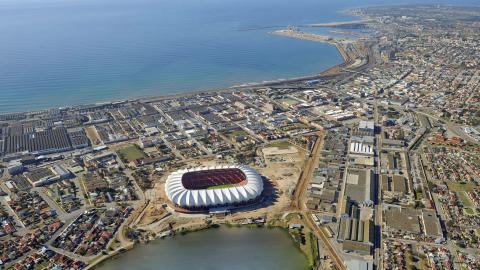This report first appeared as a part of Hudson's China in the Middle East newsletter series. To subscribe, click here.
Main Developments
Hong Kong’s Chief Executive Travels to the Middle East
On February 4, Hong Kong’s Chief Executive John Lee Ka-chiu began leading a delegation of 30 officials on a weeklong trip to Saudi Arabia and the United Arab Emirates. According to an official press release, the trip aims to “enhance connections between Hong Kong and the two countries in various areas such as trade, investment and culture” and promote the Belt and Road Initiative. The South China Morning Post, a Hong Kong-based newspaper owned by the Chinese Alibaba Group, tells us something more: Lee is working to entice the state-owned oil company Saudi Aramco to cross-list its stock on the Hong Kong exchange.
Cross-listing would enable investors from mainland China to purchase Aramco stock. “Saudi Arabia is at a pivotal point in its history, where the underpinnings of its longstanding strategic relationship with the US are being challenged, while fundamental economic and trade factors are driving a closer relationship with China,” said James Fok, author of Financial Cold War: A View of Sino-US Relations from the Financial Markets.
Saudi Arabia and Hong Kong signed four memoranda of understanding and two letters of intent, signaling a mutual desire to establish closer ties in business, technology, and financial markets. Lee departed for the UAE on February 6, where he will explore further business and investment opportunities for Hong Kong.
China-Iran-Russia Technology Collaboration
Both the State Department and Treasury Department are considering implementing new sanctions on Tiandy Technologies, a Chinese telecommunications company that the Commerce Department placed on an export blacklist in December. American authorities are focused on Tiandy due to its provision of technology to Tehran.
Tiandy specializes in surveillance systems, which the Islamic Revolutionary Guard Corps deploys against protestors. But the need for Washington to block Chinese technology transfers to Iran will soon move far beyond surveillance equipment. Last October, the Institute for Science and International Security issued a report on the Iranian attack drones that Russia is deploying in Ukraine. Manufacturers in China, it reveals, copy Western components used to produce combat drones and then supply them to Iran. “China plays a larger role than previously assessed in enabling Iran to manufacture and supply drones to Russian forces,” the report concludes.
China’s role in advancing Iran’s weapons systems sheds new light on the news, reported by the Wall Street Journal on February 5, that Moscow and Tehran are planning a joint production factory for Iranian drones in Russia. “Moscow and Tehran are moving ahead with plans to build a new factory in Russia that could make at least 6,000 Iranian-designed drones for the war in Ukraine, the latest sign of deepening cooperation between the two nations,” the report stated. Given the role of Chinese-manufactured components in Iranian drones, the new factory can be viewed as a tri-partite endeavor.
African Nations Championship
On February 4, Senegal beat host country Algeria in a penalty shootout to win the African Nations Championship. The final was played in the newly operational Nelson Mandela Stadium in Algeria, which was constructed by China Railway Construction Engineering Group (CRCEG) with Chinese funding. Pi Xiangkui, the manager of CRCEG’s Algeria branch, said the project is an “embodiment of our company’s implementation of the Belt and Road Initiative.”
The €300 million Nelson Mandela Stadium is just the latest installation of Beijing’s “stadium diplomacy” strategy of exerting soft power and enhancing diplomatic relations through the construction and financing of stadiums. The China Railway Construction Corporation, a state-owned entity, also built the Lusail stadium in Qatar, which hosted the 2022 FIFA World Cup opening ceremony and championship match.
Oman LNG Deal
Oman Liquefied Natural Gas LLC (Oman LNG), a joint venture company established in 1994 by a royal decree, agreed to supply one million metric tons per annum (mpta) of LNG to China International United Petroleum and Chemical Co (UNIPEC). UNIPEC is a subsidiary of the state-owned China Petroleum and Chemical Corporation. This is Oman LNG’s first LNG term deal with a Chinese firm, and the trade is set to begin in 2025.
Even though Beijing receives oil at steep discounts from Iran and Russia, it seeks to diversify its energy supply.














